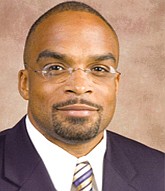Va. HBCUs to receive $36.4M in COVID-19 relief
Reginald Stuart | 5/7/2020, 6 p.m.
Just as parents, family and friends rally to help college and graduate students navigate a tough time, the federal government has carved a small slice of the multitrillion-dollar emergency CARES Act to help Virginia’s five cash-strapped historically black colleges and universities weather the financial toll brought about by the coronavirus pandemic.
The pandemic has forced institutions to temporarily shut their doors, cease operations as usual and shift their classroom and related education programs to online instruction.
The $36.4 million headed to Virginia’s HBCUs can be used to replenish the steadily growing financial losses being reported by them and most historically underfunded higher education institutions across the nation. Like most other institutions, HBCUs are wrestling with a myriad of challenges to end this school year in the black. At the same time, they are facing the coming year with considerable uncertainty.
“These institutions can use the funds to cover costs associated with the coronavirus pandemic, such as lost revenue, reimbursements for expenses already incurred, technology, faculty and staff training, payroll and costs of attendance for eligible students,” said U.S. Sens. Mark R. Warner and Tim Kaine in a statement last week detailing the allocations to Virginia schools.
“These institutions help provide traditionally underserved communities the tools they need to succeed, and we continue to advocate for them as they support their students during this ongoing crisis,” the lawmakers said in their joint statement.
The emergency financial aid brings $9.8 million each to Virginia State and Hampton universities, $13.4 million to Norfolk State University, $2.9 million to Virginia Union University and $440,000 to Virginia University of Lynchburg, according to the lawmakers’ statement.
The institutions are sending letters this week to their respective students, staffs and teachers, laying out their plans for using the funds.
The money is “very helpful in this time,” VSU President Makola M. Abdullah said in a telephone interview with the Free Press this week.
He said the usually busy campus in Ettrick is basically empty of its roughly 2,500 students.
Dr. Abdullah said the main use of VSU’s share of the federal aid “is to provide direct funding to students.” About half will be given directly to students as refunds in the wake of the school year’s disruption. The other half will help pay the institution’s ongoing fixed costs as well as added costs associated with combatting the virus.
No details were available from the four other institutions about how they will use the emergency funds.
The allocation for HBCUs came a week after Dr. Abdullah had written a letter as chair of the 19-member Council of 1890 Universities with an urgent request that Congress provide an additional $1.5 billion in aid to the nation’s nearly 100 public and private HBCUs that he wrote are “continuing to experience great losses due to the COVID-19 pandemic.”
The letter, addressed to key House and Senate education committee members, including Congressman Robert C. “Bobby” Scott of Virginia, asked the lawmakers to back legislation and funding that would temporarily triple Pell grants, expand funding for research and to bolster health care programs for nursing, physician assistants and technicians to help address staffing shortages and health disparities in communities of color in the United States.
The council also was seeking additional funds to address technology needs as the members, all land grant institutions established largely in the South following the Civil War, build their online capacity and distance learning programs.
Currently, the institutions provide education to more than 93,000 students, nearly two-thirds of whom are of African-American descent and most of whom are of the first generation in their family to attend college, according to the council.







